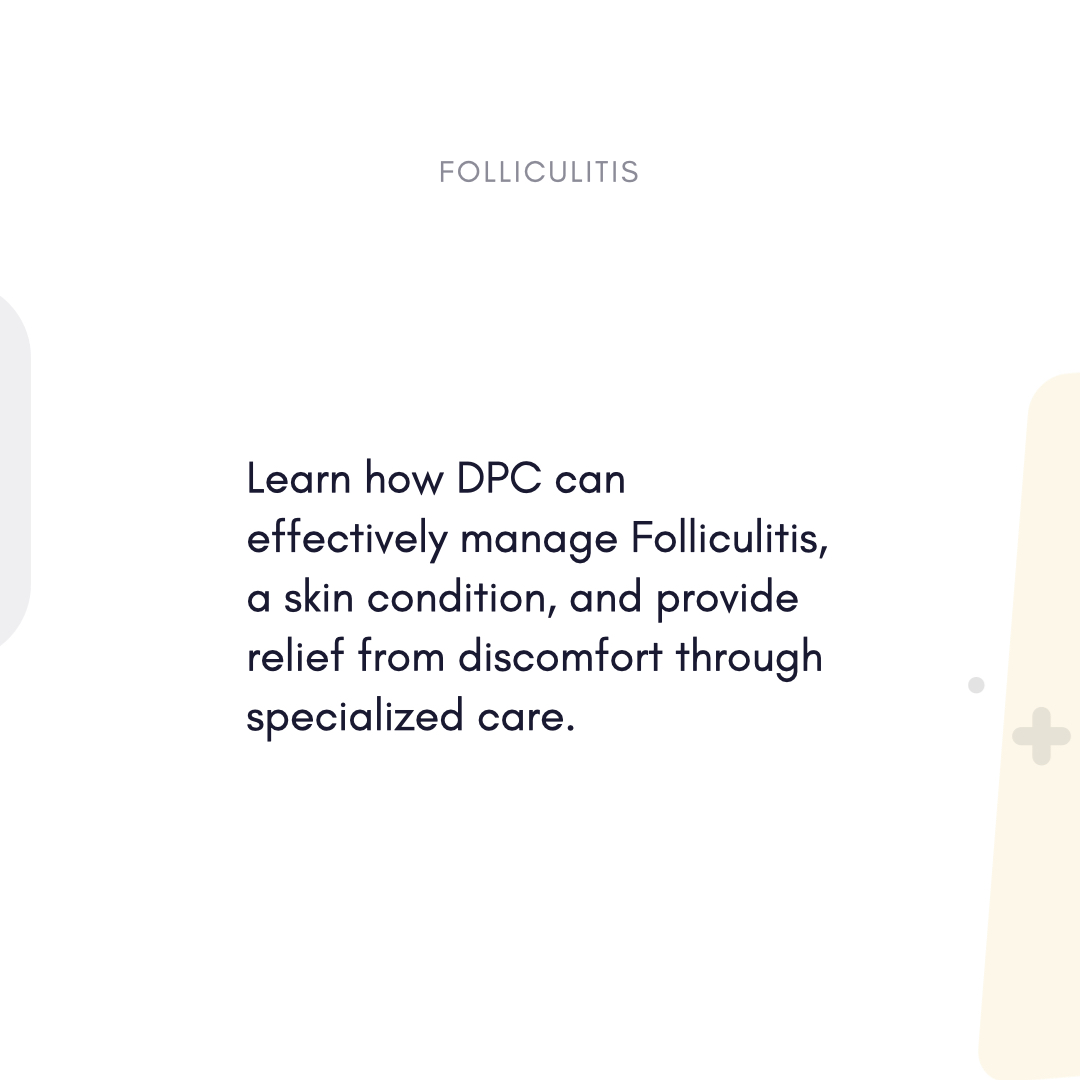Folliculitis and Direct Primary Care (DPC): Personalized, Accessible Care for Effective Management
Although bacterial (e.g., Staphylococcus aureus) or fungal infections most often cause folliculitis, this is an inflammation of hair follicles. Usually affecting the scalp, beard, thighs, or buttocks, it presents on hair-bearing skin as red dots, pustules, or itchy sores. Among the risk factors are weak immunity, tight clothing, shaving, and sweating. Untreated, it can lead to scarring or repeated infections.

DPC Enhanced Folliculitis Management
- Quick Targeting and Diagnosis
- Same-day visits: Rapid symptom evaluation to separate folliculitis from herpes, acne, eczema.
- Culture swabs uncover bacterial, fungal, or antibiotic-resistant (e.g., MRSA) causes.
- Severe case referrals: See dermatologists for deep folliculitis—that is, boils, carbuncles.
- Tailored Treatment Plans
- For bacterial cases, topically or orally, antibiotics (e.g., mupirocin, doxycycline).
- Antifungals—like ketoconazole—for fungal folliculitis.
- Modify your way of life. Guideline on shaving techniques, breathable clothing, and cleanliness.
- In chronic case management, underlying diseases (such as diabetes, eczema) generating recurrence should be addressed.
- Prevention and Education
- Instruct in good cutting and abrasion cleaning to prevent bacterial access.
- Ideas for Over-the-Counter Products: Hypoallergenic moisturizers, antimicrobial cleansers (like chlorhexidine).
- Care for follow-up: Track recovery and change course of action to prevent relapse.
DPC Benefits for Folliculitis Suffers
- Availability 24/7: Direct provider interaction for unplanned flare-ups or aggravation of symptoms.
- Transparency in costs:
- Generic drugs for USD 5–15/month instead of USD 50+ retail.
- Not a cost for visits, swabs, or follow-up hidden.
- By means of continuity of treatment: A trustworthy provider follows your history to reduce misdiagnosis risk.
DPC Specialized Folliculitis Management Based on Cause
- Tailored Care Based on Cause
- Culture guides antibiotics; MRSA-specific treatments as needed.
- Shampoos or antifungal mouth medications.
- Hot tub folliculitis (Pseudomonas) is prevented in part by avoidance strategies plus topical acetic acid.
- Way of Life and Preventive Coaching
- Shave Rules: Use new razors and shave toward hair growth.
- Personal Care: Skin: Non-comedogenic products designed to open pore blocks.
- Nutritional advice or vitamin D testing boosts immunity for recurrent cases.
- Total Support
- Mental health tools for concern over clearly visible skin problems.
- Specialized coordination for comorbid conditions including diabetic management.
Real-Life Scenarios from DPC in Action
- Case 1: Recurrent beard folliculitis was cleared with referrals for DPC-guided clindamycin gel and laser hair removal.
- Case 2: Maria, 45: Weight control and advice on breathable fabrics help clear persistent buttock folliculitis.
Why DPC Stands Out for Folliculitis
- Accuracy and Speed: Early testing and treatment reduce scarring risks and infection spread.
- Preventive Focus: Education in lifestyle and hygiene helps lower recurrence rates.
- Accessible Healthcare: Treatments and medications (including abscess incision/drainage) have clear costs.
Use DPC to take charge of your skin condition.
Folliculitis does not have to bring continuous annoyance. DPC guarantees:
- Quick access to diagnostics and treatments.
- Tailored methods to address fundamental causes.
- Continuous help to prevent next flares.






